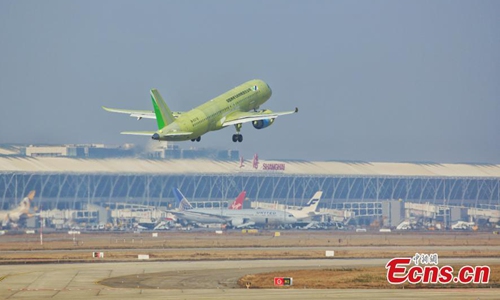HOME >> SOURCE
US' reported ban on plane engines to China self-destructive: experts
By Wang Cong and Song Lin Source:Global Times Published: 2020/2/16 22:43:32

106 model aircraft, one prototype of China's home developed large passenger C919 jetliner, completes its first flight in Shanghai on December 27, 2019, according to the Commercial Aircraft Corporation of China (COMAC). Photo:China News Service
The plan, even if not followed through, marks another escalation in the US' relentless, ill-intentioned campaign to contain China's economic and technological rise following crackdowns on Chinese telecom firm Huawei.
It also casts more uncertainty on the otherwise thawing bilateral relationship between the world's two biggest economies, the experts noted.
US officials are considering whether to stop US companies, including GE and Honeywell, from supplying engines and other components for China's domestic C919 passenger jet, which is still undergoing flight tests, Reuters reported on Saturday, citing unnamed sources. Discussions among US officials are expected next week and later in the month, Reuters said.
As the C919, developed by Commercial Aircraft Corp of China (COMAC), relies on some key components from the US, including engine and flight control systems, a potential ban on such sales could affect the development of the widely hailed passenger jet, analysts noted.
However, the move will not only be unable to rein in the C919's rise, as intended by US officials, but also hurt the US companies in the long run, according to Wang Yanan, chief editor of Aerospace Knowledge magazine.
"There is no benefit here for the US because [the move] will prompt China to look for other suppliers such as engines from Europe. There are ready-to-use products from the UK's Rolls-Royce," Wang told the Global Times on Sunday. "It will also accelerate China's research and development for its own engines."
Part of what has fueled US consideration about banning the airplane component sales to China was worries that such supplies could help China's rise as a competitor to US planemaker Boeing, Reuters noted.
The move is also in line with the US government's protectionist and politically motivated trade policies that have not only hurt businesses on both sides but also the global supply chain. It would also create new hurdles for both sides to implement the phase one trade agreement, under which China has agreed to increase certain US imports, according to Gao Lingyun, an expert at the Chinese Academy of Social Sciences in Beijing.
"It's not China that does not want to buy from the US; it's the US that does not want to sell," Gao told the Global Times on Sunday, pointing out that the airplane components are not on the list of products the US bans.
"If the US continues on this path, then don't take it for granted that China will not also take countermeasures. In fact, there are many things that we can stop selling to the US."
Facing the US' intensifying trade and technology protectionism, Chinese officials have threatened to punish US companies that hurt Chinese interests with an "unreliable entity list," which is still under development. Chinese officials have also suggested limiting rare-earth exports to the US, which are essential to the production of high-tech products, including airplane components.
Even without China's retaliation, US companies will bear the dire consequences of the protectionist moves of the US government, said Mei Xinyu, a research fellow at the Chinese Academy of International Trade and Economic Cooperation.
"The US' crackdown on China in technologies has made many international buyers realize that US companies cannot be reliable suppliers any longer," Mei told the Global Times on Sunday. "The US can do whatever it wants to do, but it will bear the brunt itself."
US companies, including crisis-hit Boeing, GE and Honeywell, have huge markets in China and losing such a market could exacerbate the downfall of these companies rather than help them, experts noted.